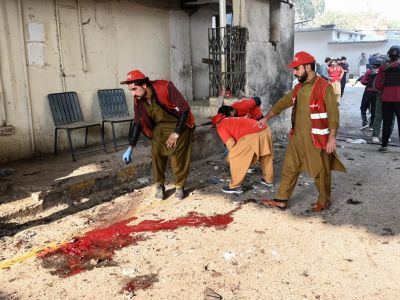Up to 700 paratroopers are to leave Britain for Macedonia from the early hours of Thursday, where they will form part of a British-led NATO force collecting weapons from ethnic Albanian rebels, the defense ministry here said.
The soldiers were expected to fly out of Brize Norton and Lyneham, two Royal Air Force bases in southwest England.
"Between 650 and 700 men are flying out from the 2nd battalion of the Parachute Regiment," a defense ministry spokesman told AFP.
They were expected to leave on a number of flights from about 2:30 am (0130 GMT).
"The first guys will be in Macedonia on Thursday morning -- that's the plan," the spokesman said.
"They will go as fast as we can process them and get them out."
A British advance contingent of about 400 troops from the rapid-reaction 16 Air Assault Brigade is already setting up headquarters in the Macedonian capital Skopje.
They are preparing the ground for the full NATO mission, which will involve 3,500 troops in total.
NATO headquarters in Brussels announced the launch of Operation Essential Harvest at 1000 GMT.
The alliance has given itself a month to complete the delicate mission, which is being carried out under the terms of a Western-brokered agreement with Macedonian political leaders.
The seven-month conflict there has pitted ethnic Albanian rebels, who complain that they are treated like second-class citizens, against government forces.
Key to the success of the operation will be whether a shaky ceasefire agreed between the two sides holds.
The British paratroopers were to leave their base in Colchester in eastern England Wednesday afternoon for a final briefing before traveling to military air bases for their flights.
British defense sources have stressed that the deployment is neither a peacekeeping nor disarmament operation, but an "operation to collect weapons voluntarily.”
However, General Wesley Clarke, commander of NATO forces in Kosovo told the BBC that the alliance had to be "alert to the continuing evolution of the situation" in neighboring Macedonia.
"There is still violence in the area and it's not possible to eliminate all risks," he said.
"I would have preferred to have seen a broader mandate initially. I think the most important thing now is to get the troops in there.
"NATO's presence on the ground signifies something. The question now is doing the best they can with the mission they've got and I think the NATO member nations, including the UK, have to be alert to the continuing evolution of the situation.
"If NATO's mission needs to change after the troops are in there then hopefully NATO governments will have the wisdom to change it."
Iain Duncan Smith, defense spokesman for the opposition Conservatives, who is also bidding for the leadership of the party, warned last week that the NATO troops could be sucked in for longer than the planned 30 days.
"If the ceasefire does break down or the disarmament process is not completed successfully, then there is a strong possibility that NATO forces could end up being deployed for much longer than the currently envisaged 30-day mission," he said.
Menzies Campbell, foreign affairs spokesman for the Liberal Democrats, Britain's smaller opposition party, also voiced skepticism over the time limit.
"Personally I don't believe that the 30-day limit to this operation will be maintained and NATO should be honest enough to acknowledge this," he said -- LONDON (AFP)
© 2001 Al Bawaba (www.albawaba.com)









